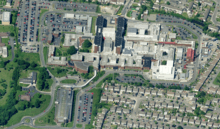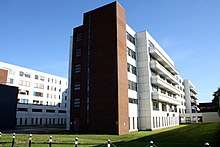Beaumont Hospital, Dublin
| Beaumont Hospital | |
|---|---|
| Health Service Executive | |
 | |
| Geography | |
| Location | Beaumont, County Dublin, Ireland |
| Coordinates | Coordinates: 53°23′28″N 6°13′20″W / 53.391142°N 6.222154°W |
| Organisation | |
| Care system | RCSI Hospitals Group |
| Funding | €366,025,000 |
| Hospital type | General |
| Affiliated university |
Royal College of Surgeons in Ireland Dublin City University |
| Services | |
| Emergency department | Yes |
| Beds | 820 |
| History | |
| Founded | September 29, 1987 |
| Links | |
| Website | http://www.beaumont.ie |
Beaumont Hospital is a large, public academic teaching and voluntary hospital located in Beaumont, Dublin, Ireland. It is located 5km from Dublin City Centre. It is the second largest hospital in the Republic of Ireland. It is located to the east of the M1 motorway and to the south of the M50. The Hospital's main entrance is at the south side of the site and is approached via the drive from the Beaumont Road entrance. Access to the Hospital is also provided at Trim Road. It provides 24-hour emergency service and acute care services across 54 medical specialties to a local community of some 290,000 people. In addition, it is a Designated Cancer Centre and the Regional Treatment Centre for Ear, Nose and Throat, and Gastroenterology.[1] It is also the National Referral Centre for Neurosurgery and Neurology, Renal Transplantation, and Cochlear Implantation. It is one of the largest acute general hospitals in Ireland. An average 60 patients per day are admitted for trauma or elective treatment, making it one of the busiest general Hospitals in the country. It employs approximately 3,000 staff and has 820 beds. It is the principal teaching hospital for the Royal College of Surgeons in Ireland.[1] For taxation purposes, Beaumont Hospital and the Beaumont Hospital Foundation are both registered charities.[1] In 2015, the Hospital had a gross income of €366,025,000 and a total expenditure of €366,025,000.[1]

History
Beaumont Hospital was planned and commissioned from 1978 to 1984 and represented an investment of IR£50 million. Its design is a direct replica of Cork University College Hospital. It opened on November 29, 1987 following the closure of two smaller and older Dublin hospitals: The Charitable Infirmary, better known as Jervis Street Hospital and St. Lawrence's Hospital (known as The Richmond).[2] Beaumont Hospital took over management of St. Joseph's Hospital, Dublin, which is located 2 miles east of Beaumont Hospital in Raheny, in 2004. The Dublin Brain Bank, a research facility for post mortem storage and examination of brain tissue, opened at Beaumont Hospital in 2008. Recent additional developments include the opening of a Radiation oncology unit (2012), the opening of a new adult Cystic fibrosis ward (2011), the opening of a new Stroke unit with 24/7 thrombolysis service (November 2009) and the opening of a Medical Assessment Unit (2012). A 100-bedded long term care residential unit, called Raheny Community Nursing Unit, managed by Beaumont Hospital at St. Joseph's Hospital, was formally opened by the Irish Minister for Health Dr. James Reilly (Irish politician) T.D., in November 2012. Construction of a new Acute Psychiatry Unit at Beaumont Hospital was completed in 2013. Construction of a new Geriatric Medicine day hospital at St. Joseph's Hospital Raheny commenced in January 2013 and the unit opened in February 2014.
Education
Beaumont is the principal undergraduate and postgraduate medical training and research centre associated with the Royal College of Surgeons in Ireland with whom it shares its campus. It also provides clinical training for undergraduate nursing students from Dublin City University.
Specialities
- National Referral Centre for Neurological Treatment.
- National referral Centre for Neurosurgery
- National Referral Centre for Kidney transplantation (including living donors) and pancreatic transplantation.
- Regional Ear, Nose and Throat Centre and National Centre for Cochlear implantation.
- Regional Gastroenterology Centre
In addition Beaumont Hospital was designated as one of Ireland's eight Cancer Centres of Excellence in 2009 by the then Minister for Health, Mary HarneyT.D., Beaumont Hospital currently provides regional cancer services to the North East Region of the Republic of Ireland (i.e. Counties Louth, Meath, Cavan & Monaghan) for breast cancer, lung cancer, bowel cancer and prostate cancer in addition to providing cancer services to its local catchment population.It provides a Haematology cancer service for Counties Louth and Meath in addition to its local catchment population. Beaumont Hospital is one of two hospitals (the other being Cork University Hospital) which offers neuro-oncology treatment to patients throughout the Republic of Ireland. Beaumont Hospital's acute stroke service offers acute interventional neuroradiology (e.g. thrombectomy) and neurosurgical (e.g. hemi-craniectomy) services for acute stroke patients referred from other hospitals in the Greater Dublin Area. The National Poison information center for the Republic of Ireland is based at Beaumont Hospital.
Clinical research centre
The Smurfit Education & Research Centre is the principal clinical research centre on the site of Beaumont Hospital. It provides teaching facilities for medical students and research laboratories which are active in a number of areas including Cystic fibrosis, Alpha 1-antitrypsin deficiency and Head and neck cancer. Other major areas of research undertaken at Beaumont Hospital include Kidney transplantation, Neurosurgery, Allergic rhinitis, Motor neurone disease, Epilepsy, pituitary disease, Medical education, Surgery, cancer biology and Stroke. Research carried out with basic scientists from the RCSI medical school also takes place. Researchers from RCSI medical school also contribute to the Dublin Molecular Medicine Centre.
Services
The hospital provides 820 beds, of which 631 are in-patient acute beds, while 110 are reserved for acute day cases. A further 10 beds are designated for in-patient psychiatric care.[3] In-patient services include general medicine, general surgery, accident and emergency, neurosurgery, maxillofacial surgery, dermatology, Geriatric medicine, nephrology and dialysis, endocrinology, infectious disease, respiratory medicine, rheumatology, ophthalmology, otorhinolaryngology (ENT), plastic surgery, urology, oncology, cardiology, orthopaedics, vascular surgery, psychiatry, obstetrics and gynaecology, haematology, paediatrics, anaesthesia, radiology.[3]
Waiting times
The national median waiting time for surgery in November 2009 stood at 2.5 months; at Beaumont Hospital this figure was 1.7 months. Overall waiting time was 1.6 months, below the national median of 2.4 months.[4] As of November 2009,[4] the National Treatment Purchase Fund listed the following waiting times for procedures:
Surgical
- adult patients waiting 3–6 months: 236* adult patients waiting 6–12 months: 100
- adult patients waiting over 12 months: 8
- child patients waiting 3–6 months: 7
- child surgical patients waiting 6–12 months: 2
- child surgical patients waiting over 12 months: 0
Medical
- adult patients waiting 3–6 months: 160
- adult patients waiting 6–12 months: 94
- adult patients waiting over 12 months: 4
- adult patients waiting over 36 months: >=1
- child patients waiting 6–12 months: 0
- child patients waiting over 12 months: 0
Hygiene
Independent audits rated hygiene levels as 62% satisfactory in 2005,[5] rising to 83% in 2006.[6] Hospital-acquired infection affected 7.2% of patients in 2007, with a Methicillin-resistant Staphylococcus aureus (MRSA) infection rate of 0.23 per 1,000 bed days in 2007.[3]
Deaths
- John Hinds (doctor), funded for Air Ambulance Northern Ireland and motorcycle rapid response Doctor, serving at every motorcycle racing events north and south of Ireland. Died at Skerries 100 practice session, 21 March 1980 - 4 July 2015
- Robbie McCallion, member of the Garda Síochána injured on duty, 1979-2009[7]
- Laurence Ryan, Bishop of Kildare, 1931-2003
References
- 1 2 3 4 "Charities Regulatory Authority - Beaumont Hospital". Charities Regulatory Authority.
- ↑ "About us". Archived from the original on 2007-05-07. Retrieved 2007-05-17.
- 1 2 3 Beaumont Hospital Archived 2011-09-27 at the Wayback Machine. voluntary hospital governed by Hospital Board and the Irish Health Service Executive
- 1 2 "Report on The National Patient Treatment Register" (PDF). The National Treatment Purchase Fund. November 2009. Retrieved 2010-07-09.
- ↑ "Report on a National Acute Hospitals Hygiene Audit undertaken on behalf of the National Hospitals Office, Health Service Executive" (PDF). Health Service Executive. October 2005. Archived from the original (PDF) on 14 July 2010. Retrieved 2010-07-04.
- ↑ "Report on the Second National Acute Hospitals Hygiene Audit" (PDF). Health Service Executive. June 2006. Archived from the original (PDF) on 13 June 2010. Retrieved 2010-07-16.
- ↑ "McCallion, Robert". Garda Síochána. Retrieved 5 October 2018.